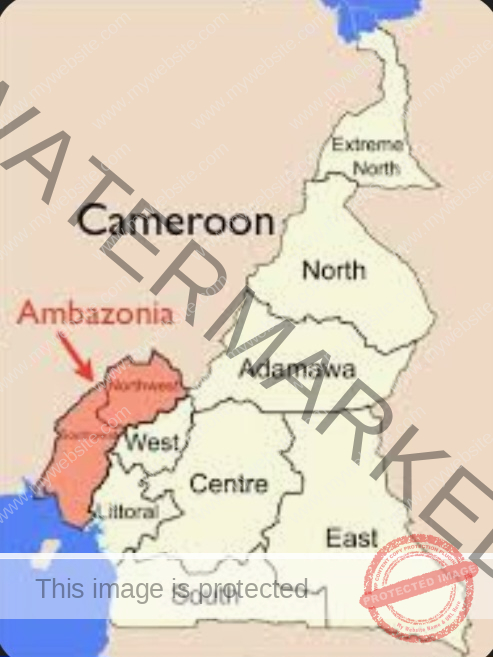Cameroon entered the United Nations on 20 September 1960 as the territory granted independence from France. Southern Cameroons (Ambazonia) was not part of that accession.
By The Independentist – Editorial desk
The events of 2025 have only confirmed what Ambazonians have known for decades: the so-called “international community” is not a neutral referee in our struggle. It is an invested stakeholder in preserving the very arrangement that robs us of our sovereignty.
When the United Nations signed its May 2025 agreement with Paul Biya’s regime to “support free and fair elections” in Cameroon, it was not a harmless technical gesture. It was a political choice — one that assumed, without question, that Cameroon’s current borders are legitimate. That single assumption erases our history and buries the truth.
That truth is inconvenient for both Yaoundé and its allies: there has never been a treaty of union merging the former British Southern Cameroons with La République du Cameroun. The UN itself supervised the 1961 plebiscite, offering us a false binary — join Nigeria or join La République — while deliberately excluding the option of full independence. UN Resolution 1608 required that before 1 October 1961, the UK, La République, and Southern Cameroons agree on the legal terms of any union. No such agreement was signed. No treaty was ratified. No instrument was deposited in the UN Treaty Series.
Cameroon entered the United Nations on 20 September 1960 as the territory granted independence from France. Southern Cameroons was not part of that accession. In law, our homeland remains what it was before the annexation — a separate territory whose sovereignty was never lawfully transferred.
President Dr. Samuel Ikome Sako’s position is anchored in this reality. He rejects Yaoundé’s authority over Ambazonia not merely because it is corrupt or authoritarian, but because it is illegal. To participate in their elections is to endorse a false union and to surrender our legal standing under international law.
France knows this better than anyone. Its archives contain the evidence, yet Paris has no appetite for decolonisation in a territory it still regards as part of its African sphere of influence. By branding us “separatists” rather than recognising us as a people under occupation, France preserves the status quo — a status quo that delivers strategic access, economic contracts, and military cooperation.
The UN also knows. It holds the historical record in its own vaults. Yet the UN operates within a political framework dominated by its most powerful member states. With France holding a permanent seat on the Security Council, the UN has every incentive to treat Cameroon’s colonial boundaries as settled, even when the legal foundation for those boundaries is absent. By funding and “supporting” elections in Yaoundé, the UN is not simply helping with logistics — it is legitimising an illegal annexation.
This is why Ambazonians must rid themselves of illusions about external salvation. The liberation of our homeland will not be driven by diplomatic sympathy from those who have a vested interest in keeping us inside Cameroon’s map. Our task is to make the truth undeniable, to educate both our own people and the world: there is no treaty, no lawful merger, and no moral or legal duty to remain under La République du Cameroun’s rule.
The silent watchers will not move until the cost of their silence outweighs the comfort of their complicity. That tipping point will not come from speeches in Yaoundé or debates in New York; it will come from the unrelenting assertion of our legal status and the undeniable reality of our resistance.
The Independentist will continue to shine a light where others prefer shadows — because the first step in dismantling a lie is to name it.
Legal Notes – The Ambazonian Case in International Law
- UN General Assembly Resolution 1514 (XV) – 14 Dec 1960
Declares the right to self-determination. Integration with another state must follow internationally recognised procedures.
- UN General Assembly Resolution 1352 (XIV) – 16 Oct 1959
Directed the UK to prepare for the self-determination of the Trust Territory of Southern Cameroons.
- UN General Assembly Resolution 1608 (XV) – 21 Apr 1961
Called for the UK, La République du Cameroun, and Southern Cameroons to sign arrangements for any union before 1 Oct 1961.
No such arrangements were signed.
- Absence of a Treaty of Union
UN Treaty Series: No registered treaty merging Southern Cameroons with La République du Cameroun.
British Archives: No merger document exists.
- Vienna Convention on the Law of Treaties (1969)
Treaties must be signed, ratified, and registered to be binding. None exists for a Cameroon–Southern Cameroons union.
- Montevideo Convention (1933) – Criteria for Statehood
✔ Permanent population
✔ Defined territory
✔ Government
✔ Capacity to engage in foreign relations
Southern Cameroons met all four before 1 Oct 1961.
- Legal Conclusion
Without a treaty of union, Ambazonia’s status is that of a people under occupation, not a province in rebellion.
The Independentist – Editorial desk

